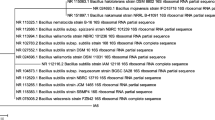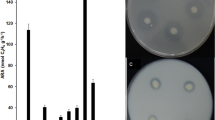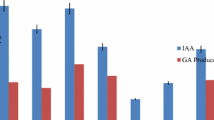Abstract
Phosphate-solubilizing bacteria (PSB) have been known to improve soil fixed phosphorus (P) availability to crop. However, PSB performance under thermal stress is poorly understood. The purpose of this study was to isolate thermo-tolerant PSB from the cotton (Gossypium hirsutum L.) rhizosphere, cultivated in the alkaline soil of a semi-arid region. Seventeen isolates were identified as efficient PSB on the National Botanical Research Institute’s Phosphate (NBRIP) agar plate. The P-solubilizing activity was observed on NBRIP liquid media and in soil incubated at 30, 40, 45, and 50 °C. Cotton growth-promoting traits of the strains were tested in the laboratory and field conditions. The phosphorus solubilization index (PSI) for isolate TPB11 (2.62) was the highest, followed by TPB19 (2.26), TPB30 (2.26), and TPB8 (2.35). The isolates TPB4, TPB19, and TPB30 significantly improved P-solubilizing activity on NBRIP broth and in soil at 30, 40, 45, and 50 °C. The seed inoculation of PSB significantly increased cotton seedling growth in the laboratory. Isolate TPB30 showed the maximum increase in shoot length (+ 45%), root length (+ 167%), shoot fresh weight (+ 143%), shoot dry weight (+ 54%), and vigor index (+ 116%) over control. While isolate TPB4 showed the maximum increase in root fresh weight (+ 180%) and root dry weight (+ 76%) as compared to control. The isolate TPB19 showed the maximum increase in cotton seed germination (+ 89%) over control. Readings by the Soil Plant Analysis Development (SPAD) meter, leaf area index, photosynthetic rate, seed cotton, and biomass yield of field-grown cotton were significantly improved in comparison to control by the PSB inoculation. Inoculation with TPB30 demonstrated maximum increase in seed cotton yield (+ 26%) and biomass yield (+ 30%) over control. The efficient isolates (TPB4, TPB19, and TPB30) were identified as Bacillus subtilis subsp. subtilis, Bacillus halotolerans, and Bacillus pumilus, respectively, and showed thermal stability. Hence, these isolates can be assumed as potential inoculants to improve cotton production under natural conditions in P-deficient soils of the semi-arid region. The study results suggested that the efficient PSB in the cotton rhizosphere could improve cotton production under high-temperature growing conditions.




Similar content being viewed by others
References
Abd El-Daim IA, Bejai S, Meijer J (2019) Bacillus velezensis 5113 Induced metabolic and molecular reprogramming during abiotic stress tolerance in wheat. Sci Rep 9:1–18. https://doi.org/10.1038/s41598-019-52567-x
Abdul-Baki AA, Anderson JD (1973) Vigor determination in soybean seed by multiple criteria 1. Crop Sci 13:630–633. https://doi.org/10.2135/cropsci1973.0011183X001300060013x
Achal V, Savant VV, Reddy MS (2007) Phosphate solubilization by a wild type strain and UV-induced mutants of Aspergillus tubingensis. Soil Biol Biochem 39:695–699. https://doi.org/10.1016/j.soilbio.2006.09.003
Ahmad I, AkhtarMJ ZZA, Naveed M, Mitter B, Sessitsch A (2014) Cadmium tolerant bacteria induce metal stress tolerance in cereals. Environ Sci Pollut Res 21:11054–11065. https://doi.org/10.1007/s11356-014-3010-9
Ahmad M, Ahmad I, Hilger TH, Nadeem SM, Akhtar MF, Jamil M, Hussain A, Zahir ZA (2018) Preliminary study on phosphate solubilizing Bacillus subtilis strain Q3 and Paenibacillus sp. strain Q6 for improving cotton growth under alkaline conditions. PeerJ 6:e5122. https://doi.org/10.7717/peerj.5122
Ali SZ, Sandhya V, Grover M, Linga VR, Bandi V (2011) Effect of inoculation with a thermotolerant plant growth promoting Pseudomonas putida strain AKMP7 on growth of wheat (Triticum spp.) under heat stress. J Plant Interact 6:239–246. https://doi.org/10.1080/17429145.2010.545147
Alikhani HA, Saleh-Rastin N, Antoun H (2006) Phosphate solubilization activity of rhizobia native to Iranian soils. Plant Soil 287:35–41. https://doi.org/10.1007/s11104-006-9059-6
Ashraf M, Hasnain S, Berge O, Mahmood T (2004) Inoculating wheat seedlings with exopolysaccharide-producing bacteria restricts sodium uptake and stimulates plant growth under salt stress. Biol Fertil Soils 40:157–162. https://doi.org/10.1007/s00374-004-0766-y
Bakker AW, Schippers B (1987) Microbial cyanide production in the rhizosphere in relation to potato yield reduction and Pseudomonas spp-mediated plant growth-stimulation. Soil Biol Biochem 19:451–457. https://doi.org/10.1016/0038-0717(87)90037-X
Barillot CDC, Sarde C-O, Bert V, Tarnaud E, Cochet N (2013) A standardized method for the sampling of rhizosphere and rhizoplan soil bacteria associated to a herbaceous root system. Ann Microbiol 63:471–476. https://doi.org/10.1007/s13213-012-0491-y
Batool S, Iqbal A (2019) Phosphate solubilizing rhizobacteria as alternative of chemical fertilizer for growth and yield of Triticum aestivum (Var. Galaxy 2013). Saudi J Biol Sci 26:1400–1410. https://doi.org/10.1016/j.sjbs.2018.05.024
Battisti DS, Naylor RL (2009) Historical warnings of future food insecurity with unprecedented seasonal heat. Science (80-) 323:240–244. https://doi.org/10.1126/science.1164363
Beneduzi A, Peres D, Vargas LK, Bodanese-Zanettini MH, Passaglia LMP (2008) Evaluation of genetic diversity and plant growth promoting activities of nitrogen-fixing bacilli isolated from rice fields in South Brazil. Appl Soil Ecol 39:311–320. https://doi.org/10.1016/j.apsoil.2008.01.006
Bhaduri A (2012) Climate Change. Econ Labour Relations Rev 23:3–12. https://doi.org/10.1177/103530461202300301
Bünemann EK (2015) Assessment of gross and net mineralization rates of soil organic phosphorus–a review. Soil Biol Biochem 89:82–98. https://doi.org/10.1016/j.soilbio.2015.06.026
Canbolat MY, Bilen S, Çakmakçı R, Şahin F, Aydın A (2006) Effect of plant growth-promoting bacteria and soil compaction on barley seedling growth, nutrient uptake, soil properties and rhizosphere microflora. Biol Fertil Soils 42:350–357. https://doi.org/10.1007/s00374-005-0034-9
Chang CH, Yang SS (2009) Thermo-tolerant phosphate-solubilizing microbes for multi-functional biofertilizer preparation. Bioresour Technol 100:1648–1658. https://doi.org/10.1016/j.biortech.2008.09.009
Chen YP, Rekha PD, Arun AB, Shen FT, Lai W-A, Young CC (2006) Phosphate solubilizing bacteria from subtropical soil and their tricalcium phosphate solubilizing abilities. Appl Soil Ecol 34:33–41. https://doi.org/10.1016/j.apsoil.2005.12.002
Delvasto P, Valverde A, Ballester A, Igual JM, Muñoz JA, González F, Blázquez ML, García C (2006) Characterization of brushite as a re-crystallization product formed during bacterial solubilization of hydroxyapatite in batch cultures. Soil Biol Biochem 38:2645–2654. https://doi.org/10.1016/j.soilbio.2006.03.020
Dunne C, Crowley JJ, Moënne-Loccoz Y, Dowling DN, O’Gara F (1997) Biological control of Pythium ultimum by Stenotrophomonas maltophilia W81 is mediated by an extracellular proteolytic activity. Microbiology 143:3921–3931. https://doi.org/10.1099/00221287-143-12-3921
Estrada-Bonilla GA, Durrer A, Cardoso EJBN (2021) Use of compost and phosphate-solubilizing bacteria affect sugarcane mineral nutrition, phosphorus availability, and the soil bacterial community. Appl Soil Ecol 157:103760. https://doi.org/10.1016/j.apsoil.2020.103760
Gao X, Guo H, Zhang Q, Guo H, Zhang L, Zhang C, Gou Z, Liu Y, Wei J, Chen A (2020) Arbuscular mycorrhizal fungi (AMF) enhanced the growth, yield, fiber quality and phosphorus regulation in upland cotton (Gossypium hirsutum L.). Sci Rep 10:1–12. https://doi.org/10.1038/s41598-020-59180-3
Glick BR, Karaturovíc DM, Newell PC (1995) A novel procedure for rapid isolation of plant growth promoting pseudomonads. Can J Microbiol 41:533–536. https://doi.org/10.1139/m95-070
Gupta R, Singal R, Shankar A, Kuhad RC, Saxena RK (1994) A modified plate assay for screening phosphate solubilizing microorganisms. J Gen Appl Microbiol 40:255–260. https://doi.org/10.2323/jgam.40.255
Hafeez FY, Safdar ME, Chaudhry AU, Malik KA (2004) Rhizobial inoculation improves seedling emergence, nutrient uptake, and growth of cotton. Aust J Exp Agric 44:617–622
Hanif K, Hameed S, Imran A, Naqqash T, Shahid M, Van Elsas JD (2015) Isolation and characterization of a β-propeller gene containing phosphobacterium Bacillus subtilis strain KPS-11 for growth promotion of potato (Solanum tuberosum L.). Front Microbiol 6:583. https://doi.org/10.3389/fmicb.2015.00583
Hegyi A, Nguyen TBK, Posta K (2021) Metagenomic analysis of bacterial communities in agricultural soils from vietnam with special attention to phosphate solubilizing bacteria. Microorganisms 9:. https://doi.org/10.3390/microorganisms9091796
Holt JG, Krieg NR, Sneath PHA, Staley JT, Williams ST (1994) Bergey’s manual of determinative bacteriology. Williams and Wilikins, Baltimore.
Hussain MB, Zahir ZA (2014) Scrutinizing rhizobia to rescue maize growth under reduced water conditions. https://doi.org/10.2136/sssaj2013.07.0315
Igiehon NO, Babalola OO (2018) Below-ground-above-ground plant-microbial interactions: focusing on soybean, rhizobacteria and mycorrhizal fungi. Open Microbiol J 12:261–279. https://doi.org/10.2174/1874285801812010261
Illmer P, Schinner F (1992) Solubilization of inorganic phosphates by microorganisms isolated from forest soils. Soil Biol Biochem 24:389–395. https://doi.org/10.1016/0038-0717(92)90199-8
Intergovernmental Panel on Climate Change (2014) AR5 Synthesis report: Climate change 2014. Available via https://www.ipcc.ch/assessment-report/ar5/. Accessed 15 November 2021
International Trade Centre (2021) Cotton exporter’s guide. Available via https://www.cottonguide.org/cottonguide/. Accessed 01 December 2021
Johan PD, Ahmed OH, Omar L, Hasbullah NA (2021) Phosphorus transformation in soils following co-application of charcoal and wood ash. Agronomy 11:2010. https://doi.org/10.3390/agronomy11102010
Johri JK, Surange S, Nautiyal CS (1999) Occurrence of salt, pH, and temperature-tolerant, phosphate-solubilizing bacteria in alkaline soils. Curr Microbiol 39:89–93. https://doi.org/10.1007/s002849900424
Joo GJ, Kim YM, Kim JT, Rhee IK, Kim JH, Lee IJ (2005) Gibberellins-producing rhizobacteria increase endogenous gibberellins content and promote growth of red peppers. J Microbiol 43:510–515
Kalayu G (2019) Phosphate solubilizing microorganisms: promising approach as biofertilizers. Int J Agron 2019:1–7. https://doi.org/10.1155/2019/4917256
Khan MA, Asaf S, Khan AL, Jan R, Kang S, Kim K, Lee I (2020) Thermotolerance effect of plant growth- promoting Bacillus cereus SA1 on soybean during heat stress. BMC Microbiol 20:175. https://doi.org/10.1186/s12866-020-01822-7
Khater AEM, Al-Sewaidan HA (2008) Radiation exposure due to agricultural uses of phosphate fertilizers. Radiat Meas 43:1402–1407. https://doi.org/10.1016/j.radmeas.2008.04.084
Kimura M (1980) A simple method for estimating evolutionary rates of base substitutions through comparative studies of nucleotide sequences. J Mol Evol 16:111–120
Kucey RMN, Janzen HH, Leggett ME (1989) Microbially mediated increases in plant-available phosphorus. Adv Agron 42:199–228. https://doi.org/10.1016/S0065-2113(08)60525-8
Kumar S, Stecher G, Li M, Knyaz C, Tamura K (2018) MEGA X: molecular evolutionary genetics analysis across computing platforms. Mol Biol Evol 35:1547–1549. https://doi.org/10.1093/molbev/msy096
Lal R (2007) Soil degradation and environment quality in South Asia. Int J Ecol Environ Sci 33:91–103
Lamsal K, Kim SW, Kim YS, Lee YS (2013) Biocontrol of late blight and plant growth promotion in tomato using rhizobacterial isolates. J Microbiol Biotechnol 23:897–904
Lastochkina O, Pusenkova L, Yuldashev R, Babaev M, Garipova S, Blagova D, Khairullin R, Aliniaeifard S (2017) Effects of Bacillus subtilis on some physiological and biochemical parameters of Triticum aestivum L. (wheat) under salinity. Plant Physiol Biochem 121:80–88. https://doi.org/10.1016/j.plaphy.2017.10.020
Li L, Ye Y, Pan L, Zhu Y, Zheng S, Lin Y (2009) The induction of trehalose and glycerol in Saccharomyces cerevisiae in response to various stresses. Biochem Biophys Res Commun 387:778–783. https://doi.org/10.1016/j.bbrc.2009.07.113
Liu Z, Li YC, Zhang S, Fu Y, Fan X, Patel JS, Zhang M (2015) Characterization of phosphate-solubilizing bacteria isolated from calcareous soils. Appl Soil Ecol 96:217–224. https://doi.org/10.1016/j.apsoil.2015.08.003
Lugtenberg B, Kamilova F (2009) Plant-growth-promoting rhizobacteria. Annu Rev Microbiol 63:541–556. https://doi.org/10.1146/annurev.micro.62.081307.162918
Malik TH, Ahsan MZ (2016) Review of the cotton market in Pakistan and its future prospects. OCL - Oilseeds fats, Crop Lipids 23:. https://doi.org/10.1051/ocl/2016043
Marra LM, de Oliveira SM, Soares CRFS, de Moreira FMS (2011) Solubilization of inorganic phosphates by inoculant strains from tropical legumes. Sci Agric 68:603–609. https://doi.org/10.1590/S0103-90162011000500015
Mehta S, Nautiyal CS (2001) An efficient method for qualitative screening of phosphate-solubilizing bacteria. Curr Microbiol 43:51–56. https://doi.org/10.1007/s002840010259
Monteiro JEBA, Sentelhas PC, Chiavegato EJ, Guiselini C, Santiago AV, Prela A (2005) Estimação da área foliar do algodoeiro por meio de dimensões e massa das folhas. Bragantia 64:15–24. https://doi.org/10.1590/S0006-87052005000100002
Mukhtar T, ur Rehman S, Smith D, Sultan T, Seleiman MF, Alsadon AA, Amna, Ali S, Chaudhary HJ, Solieman THI, Ibrahim AA, Saad MAO (2020) Mitigation of heat stress in Solanum lycopersicum l. by ACC-deaminase and exopolysaccharide producing Bacillus cereus: Effects on biochemical profiling. Sustainbility 12:. https://doi.org/10.3390/su12062159
Nadeem SM, Zahir ZA, Naveed M, Arshad M (2007) Preliminary investigations on inducing salt tolerance in maize through inoculation with rhizobacteria containing ACC deaminase activity. Can J Microbiol 53:1141–1149. https://doi.org/10.1139/W07-081
Nautiyal CS (1999) An efficient microbiological growth medium for screening phosphate solubilizing microorganisms. FEMS Microbiol Lett 170:265–270. https://doi.org/10.1111/j.1574-6968.1999.tb13383.x
Nehra V, Saharan BS, Choudhary M (2016) Evaluation of Brevibacillus brevisas potential plant growth promoting rhizobacteria for cotton (Gossypium hirsutum) crop. Springerplus 5:1–10
Perez E, Sulbaran M, Ball MM, Yarzabal LA (2007) Isolation and characterization of mineral phosphate-solubilizing bacteria naturally colonizing a limonitic crust in the south-eastern Venezuelan region. Soil Biol Biochem 39:2905–2914. https://doi.org/10.1016/j.soilbio.2007.06.017
Reiner K (2016) Catalase Test Protocol. American Society for Microbiology. Available at https://asm.org/getattachment/72a871fc-ba92-4128-a194-6f1bab5c3ab7/Catalase-Test-Protocol.pdf. Accessed 01 Feb 2022
Roberts TL, Johnston AE (2015) Phosphorus use efficiency and management in agriculture. Resour Conserv Recycl 105:275–281. https://doi.org/10.1016/j.resconrec.2015.09.013
Rodrı́guez H, Fraga R (1999) Phosphate solubilizing bacteria and their role in plant growth promotion. Biotechnol Adv 17:319–339. https://doi.org/10.1016/S0734-9750(99)00014-2
Saitou N, Nei M (1987) The neighbor-joining method: a new method for reconstructing phylogenetic trees. Mol Biol Evol 4:406–425. https://doi.org/10.1093/oxfordjournals.molbev.a040454
Saleemi M, Kiani MZ, Sultan T, Khalid A, Mahmood S (2017) Integrated effect of plant growth-promoting rhizobacteria and phosphate-solubilizing microorganisms on growth of wheat (Triticum aestivum L.) under rainfed condition. Agric Food Secur 6:1–8. https://doi.org/10.1186/s40066-017-0123-7
Sarikhani MR, Khoshru B, Greiner R (2019) Isolation and identification of temperature tolerant phosphate solubilizing bacteria as a potential microbial fertilizer. World J Microbiol Biotechnol 35:1–10. https://doi.org/10.1007/s11274-019-2702-1
Sarwar M, Arshad M, Martens DA, Frankenberger WT (1992) Tryptophan-dependent biosynthesis of auxins in soil. Plant Soil 147:207–215. https://doi.org/10.1007/BF00029072
Schütz L, Gattinger A, Meier M, Müller A, Boller T, Mäder P, Mathimaran N (2018) Improving crop yield and nutrient use efficiency via biofertilization—a global meta-analysis. Front Plant Sci 8:.https://doi.org/10.3389/fpls.2017.02204
Schwyn B, Neilands JB (1987) Universal chemical assay for the detection and determination of siderophores. Anal Biochem 160:47–56. https://doi.org/10.1016/0003-2697(87)90612-9
Sharma SB, Sayyed RZ, Trivedi MH, Gobi TA (2013) Phosphate solubilizing microbes: sustainable approach for managing phosphorus deficiency in agricultural soils. Springerplus 2:1–14. https://doi.org/10.1186/2193-1801-2-587
Shields P, Cathcart L (2016) Oxidase test protocol. American Society for Microbiology. Available at https://asm.org/getattachment/00ce8639-8e76-4acb-8591-0f7b22a347c6/oxidase-test-protocol-3229.pdf. Accessed 01 Feb 2022
Spaepen S, Vanderleyden J, Remans R (2007) Indole-3-acetic acid in microbial and microorganism-plant signaling. FEMS Microbiol Rev 31:425–448. https://doi.org/10.1111/j.1574-6976.2007.00072.x
Sperber JI (1958) Solution of apatite by soil microorganisms producing organic acids. Aust J Agric Res 9:782–787. https://doi.org/10.1071/AR9580782
Steel RGD, Torrie JH (1981) Principles and procedures of statistics: a biometrical approach. J Am Stat Assoc 76:753–754. https://doi.org/10.2307/2287561
Swain MR, Laxminarayana K, Ray RC (2012) Phosphorus solubilization by thermotolerant Bacillus subtilis isolated from cow dung microflora. Agric Res 1:273–279. https://doi.org/10.1007/s40003-012-0022-x
Tahir M, Khan MB, Shahid M, Ahmad I, Khalid U, Akram M, Dawood A, Kamran M (2022) Metal-tolerant Pantoea sp. WP-5 and organic manures enhanced root exudation and phytostabilization of cadmium in the rhizosphere of maize. Environ Sci Pollut Res 29:6026–6039. https://doi.org/10.1007/s11356-021-16018-3
Takao S (1965) Organic acid production by Basidiomycetes: I. screening of acid-producing strains. Appl Microbiol 13:732–737. https://doi.org/10.1128/am.13.5.732-737.1965
Vassilev N, Vassileva M, Nikolaeva I (2006) Simultaneous P-solubilizing and biocontrol activity of microorganisms: potentials and future trends. Appl Microbiol Biotechnol 71:137–144. https://doi.org/10.1007/s00253-006-0380-z
Viruel E, Erazzú LE, Martínez Calsina L, Ferrero MA, Lucca ME, Siñeriz F (2014) Inoculation of maize with phosphate solubilizing bacteria: effect on plant growth and yield. J Soil Sci Plant Nutr 14:819–831. https://doi.org/10.4067/s0718-95162014005000065
Vyas A, Kumar H, Putatunda C (2014) In vitro phosphate solubilization by Bacillus sp. NPSBS 3. 2. 2 obtained from the cotton plant rhizosphere. 11:401–406. https://doi.org/10.13005/bbra/1288
Wahid F, Fahad S, Danish S, Adnan M, Yue Z, Saud S, Siddiqui MH, Brtnicky M, Hammerschmiedt T, Datta R (2020) Sustainable management with mycorrhizae and phosphate solubilizing bacteria for enhanced phosphorus uptake in calcareous soils. Agriculture 10:334. https://doi.org/10.3390/agriculture10080334
Wang Z, Xu G, Ma P, Lin Y, Yang X, Cao C (2017) Isolation and characterization of a phosphorus-solubilizing bacterium from rhizosphere soils and its colonization of chinese cabbage (Brassica campestris ssp. chinensis). Front Microbiol 8:1270. https://doi.org/10.3389/fmicb.2017.01270
Wani PA, Khan MS, Zaidi A (2007) Synergistic effects of the inoculation with nitrogen-fixing and phosphate-solubilizing rhizobacteria on the performance of field-grown chickpea. J Plant Nutr Soil Sci 170:283–287. https://doi.org/10.1002/jpln.200620602
Watanabe FS, Olsen SR (1965) Test of an ascorbic acid method for determining phosphorus in water and NaHCO3 extracts from soil. Soil Sci Soc Am J 29:677–678. https://doi.org/10.2136/sssaj1965.03615995002900060025x
Whitelaw MA (1999) Growth promotion of plants inoculated with phosphate-solubilizing fungi. Adv Agron 69:99–151. https://doi.org/10.1016/S0065-2113(08)60948-7
Withers PJA, Edwards AC, Foy RH (2001) Phosphorus cycling in UK agriculture and implications for phosphorus loss from soil. Soil Use Manag 17:139–149. https://doi.org/10.1111/j.1475-2743.2001.tb00020.x
World Meteorological Organization (2020) State of the global climate 2020. Available via https://library.wmo.int/index.php?lvl=notice_display&id=21880#.YgxEKOrMKUk. Accessed 01 November 2021
Yadav BK, Verma A (2012) Phosphate solubilization and mobilization in soil through microorganisms under arid ecosystems. In: Alí M (ed) The functioning of ecosystems. InTech Rijeka, pp 93–108
Yadav H, Innovations F, Gothwal RK, Nigam V (2013) Optimization of culture conditions for phosphate solubilization by a thermo- tolerant phosphate-solubilizing bacterium Brevibacillus sp. BISR-HY65 isolated from phosphate mines. Biocatal Agric Biotechnol 2:217–225. https://doi.org/10.1016/j.bcab.2013.04.005
Yadav H, Gothwal RK, Solanki PS, Nehra S, Sinha-roy S, Ghosh P (2015) Isolation and characterization of thermo-tolerant phosphate-solubilizing bacteria from a phosphate mine and their rock phosphate solubilizing abilities. Geomicrobiol J 32:475–481. https://doi.org/10.1080/01490451.2014.943856
Youseif SH (2018) Genetic diversity of plant growth promoting rhizobacteria and their effects on the growth of maize plants under greenhouse conditions. Ann Agric Sci 63:25–35. https://doi.org/10.3389/fsufs.2020.00136
Yu X, Liu X, Zhu TH, Liu GH, Mao C (2011) Isolation and characterization of phosphate-solubilizing bacteria from walnut and their effect on growth and phosphorus mobilization. Biol Fertil Soils 47:437–446. https://doi.org/10.1007/s00374-011-0548-2
Zahir ZA, Munir A, Asghar HN, Shaharoona B, Arshad M (2008) Effectiveness of rhizobacteria containing ACC deaminase for growth promotion of peas (Pisum sativum) under drought conditions. J Microbiol Biotechnol 18:958–963
Zaidi S, Usmani S, Singh BR, Musarrat J (2006) Significance of Bacillus subtilis strain SJ-101 as a bioinoculant for concurrent plant growth promotion and nickel accumulation in Brassica juncea. Chemosphere 64:991–997. https://doi.org/10.1016/j.chemosphere.2005.12.057
Zhang H, Shan B (2008) Historical records of heavy metal accumulation in sediments and the relationship with agricultural intensification in the Yangtze-Huaihe region, China. Sci Total Environ 399:113–120. https://doi.org/10.1016/j.scitotenv.2008.03.036
Zhang Z, Schwartz S, Wagner L, Miller W (2000) A greedy algorithm for aligning DNA sequences. J Comput Biol 7:203–214. https://doi.org/10.1089/10665270050081478
Acknowledgements
The current study was conducted as a part of PhD thesis of Mr. Suleman Haider Shah, a PhD scholar at Department of Soil and Environmental Sciences, MNS University of Agriculture, Multan (Pakistan). The authors thank the Muhammad Nawaz Shareef University of Agriculture, Multan (Pakistan), for providing research facilities. The authors are also thankful to Dr. Umer Hussain (ADVANCE-Dean of Faculties, Texas A&M University, USA) for his help in the English language improvement of the manuscript.
Funding
The research leading to these results received financial support from the Higher Education Commission of Pakistan under the “Indigenous Ph.D. Fellowship for 5000 Scholar, Phase-II, Batch-V” under Personal Identification No. 518–108357-2AV5-092(50042851).
Author information
Authors and Affiliations
Corresponding author
Ethics declarations
Conflict of Interest
The authors declare no competing interests.
Additional information
Publisher's Note
Springer Nature remains neutral with regard to jurisdictional claims in published maps and institutional affiliations.
Supplementary Information
Below is the link to the electronic supplementary material.
Rights and permissions
About this article
Cite this article
Shah, S.H., Hussain, M.B., Zahir, Z.A. et al. Thermal Plasticity and Cotton Production Enhancing Attributes of Phosphate-Solubilizing Bacteria from Cotton Rhizosphere. J Soil Sci Plant Nutr 22, 3885–3900 (2022). https://doi.org/10.1007/s42729-022-00937-2
Received:
Accepted:
Published:
Issue Date:
DOI: https://doi.org/10.1007/s42729-022-00937-2




